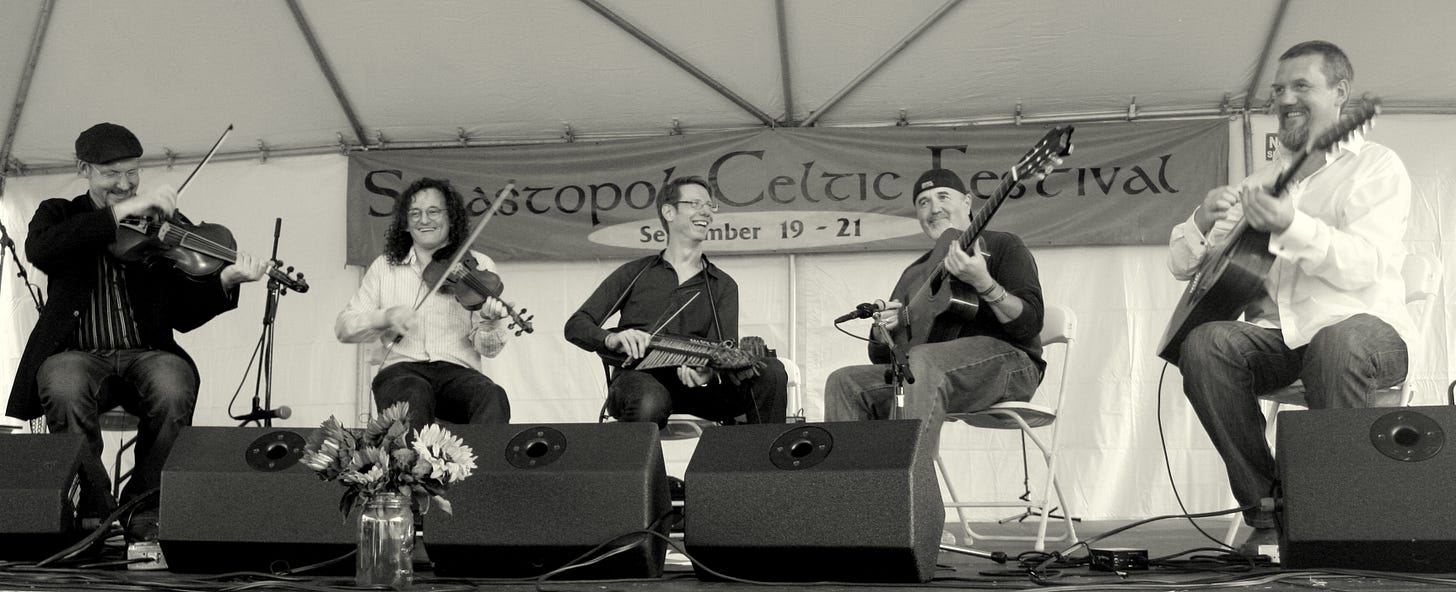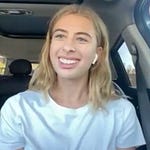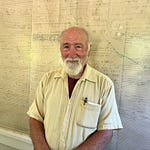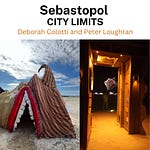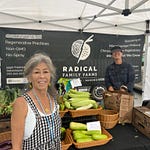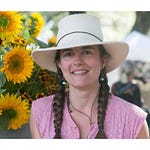Music promoter and event producer Cloud Moss produced the Sebastopol Celtic Festival for 16 years (1995-2011) and the Kate Wolf Music Festival for 24 years (1996-2021). In this interview, we talk about:
how Brad became Cloud in the 1970’s because he brought news to a couple who lived on top of a mountain in Mendocino.
his youth in the San Fernando Valley where he played sports and imagined that he would become a poetry professor.
his wandering through Europe after high school before moving to Boonville in Mendocino and then eventually attending Sonoma State.
his first experiences organizing events took place on Star Mountain at the Wheeler Ranch off Coleman Valley Road.
how the Sebastopol Celtic Festival, which grew out of his working at Copperfield’s Music, was a response to the flood that closed the Sebastopol Community Center in the mid-1990’s.
how the editor of the Sebastopol Times and News, Rollie Atkinson, prompted him to do a benefit for KRCB, which became the Kate Wolf Music Festival to honor the memory of the local musician who once worked at the newspaper.
his admiration for Kim Caruso (now Camp) who ran the Sebastopol Community Center during this period and met every challenge they faced together.
his observation that it is easier to start something new than to manage to keep it true for many years.
Cloud Moss made Sebastopol area (and Laytonville) a destination for live music at the festivals he brought to life.
Transcript
Cloud: Chris is a wonderful storyteller, harp player, penny whistle, bodhrán. He's been concentrating on the harp lately. He's also a harp maker. Uh, it’s a great pleasure to bring him back. Would you please welcome Chris Caswell?
Chris: So I've gotta tune this. I haven't tuned it yet. Um, but it only takes about 15, 17 minutes. So, uh, enjoy yourselves. Uh, I actually like tuning. I don't get tired of it, which is actually a good thing considering what I play.
<music>
Dale: Welcome to Sebastopol City Limits. I'm Dale Dougherty.
That was the opening night of 2009 Sebastopol Celtic Festival with Cloud Moss introducing harpist Chris Caswell.
My guest is Cloud Moss. He's the event producer and music promoter who organized the Sebastopol Celtic Festival and the Kate Wolf Music Festival. We'll learn how those incredible music events started But first I want to share the story of how Cloud Moss got his name.
Cloud: My given name is Brad and Moss is my last name. The name Cloud was bestowed upon me by a Welsh gypsy who --this is back in 1970, I think. Maybe 1978. I think somewhere around there. I used to live on a thousand acre parcel, five miles outside of Boonville. And on part of that parcel up above, I was down closer to the road and there used to be more traffic through the house and part of the property where I live.
So we used to be more involved with people coming and going. Up above was somebody I knew named Jackson Crazy Wolf. He was a Welshman and his wife, Osha, they lived on top of the mountain where it used to be a place called Compost College. Compost College was used by Mendocino, no, excuse me, the College of the Redwoods as an adjunct to teach people gardening.
There was a big wikiup and so forth. It was abandoned and Crazy Wolf and Osha lived up there. They'd come and go between there and the coast, Mendocino, where I first met them, I used to hike up there quite a bit and talk to them and he always used to call me "bro". And also I traveled quite a bit and because my name was Brad in a lot of different languages in different countries, it sounded to people like "bread".
So I was called anything from "pan" in Mexico to "lechem" in Israel, to "brød" in Denmark. Everywhere I went, in that language, I was called bread. So anyway one day Crazy Wolf said to me and he lived very much like a Native American to the point where he once killed a buck barehanded by grabbing its antler and breaking its neck. Anyway we were standing, the three of us in a garden. There were cumulus nimbus clouds going by with all the shapes that you could see. And he said, " if we don't get a name for you, we're just, you're just gonna be 'bro'. Then he stuck out his palm and he looked at his wife, Osha, and he said:
"You know what? I got it. He's just like those passing clouds up there. He always brings us the news and tells us what's going on down closer to town and so forth. And he's just like all those changing clouds up there. We're gonna call him Passing Cloud."
And I, after too many jokes about PC and passing gas, people just started calling me Cloud.
Dale: That's a wonderful story.
Cloud: And it stuck and I was Cloud Moss. I think one of the biggest kicks I got out of this over the years two, one, when I first started becoming a promoter and dealing with national acts and call agents and they say, yeah, can I say who's calling?
I'd say Cloud Moss and they'd go -- they couldn't get it. I had to really get my foot in the door to get to talk to people who were dealing with national acts, but when they found out, I was very detailed, that changed. But the funniest thing that ever happened was-- do you recall when we used to have the morning show on Channel 50 around here for many years? They wanted to interview me one year for the Celtic Festival, so they had me go over to Montgomery High School early in the morning. We used to have the games as well during that time, in the early days. So I got a woman caber tosser who came out and she was wearing a kilt and so forth. And she was in the background doing the caber toss. And I had to be there an hour early. And the guy who was interviewing me was the weatherman. And it was a one of those vans with the remote antenna and so forth, and he kept walking around practicing my name for the whole hour.
He kept walking around in between when he was on the set going: Cloud Moss. We get on live. He gets on live, he goes, I'm here with the director of the Sebastopol Celtic Music Festival, Clod Mouse.
For years we used to make buttons for the Celtic Festival that everybody used to wear. And they made me a button that said C L O D M O U S E.
Dale: Let's start somewhat at the beginning. Where did you grow up?
Cloud: I grew up in the San Fernando Valley in Los Angeles, a place called Sun Valley, not Idaho . And I used to cruise Van Nuys Boulevard as a kid in the high school.
Dale: Were you a musician growing up?
Cloud: I was not, although I had musical components, people in my family. I had a couple of concert master violinists and so forth. But I was not myself a musician. I was more of a athlete and a history buff.
Dale: Really?
Cloud: And I did creative writing. Actually, when I was younger, what I wanted to do was, I wanted to become a poetry professor.
Dale: Really?
Cloud: Yeah. They actually had a poetry class in my high school. Always really enjoyed poetry. I enjoyed history and like I say, I was rather athletic. And back in the day when we were all younger.
Dale: And what was your sport?
Cloud: I played baseball for about seven years or eight years as a youngster, but in high school I played some basketball and I also was on the swim team until I got very sick of swimming and chlorine.
Dale: So how does your path take you to what you end up doing? How did you make the connections between that as a high school kid to getting involved as a producer of events and such?
Cloud: I worked in high school, saved my money. Two days outta high school, I flew with a friend to Switzerland on an open-ended trip, I think it was. Anyway, he went for three months and I ended up staying for a year and a half. I lived around Europe and the Middle East and I just traveled around and got odd jobs and things like that.
I was accepted while I was gone to Sonoma State and Santa Barbara as a philosophy major and a religious studies major in the two different schools. I decided not to come back. At the time I felt like I was learning more just being on the road and taking care of myself. And I didn't go to school for about nine years.
Actually I started really playing, when I lived up in Mendocino County outside of Boonville and I first started drumming and I actually practiced a lot on oil drums. Used them like congas. Not a great thing for one's body. But I ended up studying at Ali Akbar Khan School of Music in Marin. I studied tabla, I studied darbuka doumbek.
I also went to Sonoma State. I studied silver flute, open hole flute. I naturally progressed to being able to play rhythm and then learned from some great masters and then for some particular reason. I grew up in a family that loved music. I just was not, I was not a musician and nobody immediately around me was.
I became a dance accompanist at Sonoma State. So I worked in the dance department. What happened was, I developed chronic tendonitis because I was playing so much and I had developed some bad habits. It's important actually to keep breathing I discovered, especially when you're using your body a lot, and I did not. So I was very good. I was intricate, but I was not doing things that were smart in terms of the long run. So I got chronic tendonitis. I didn't wanna leave the world of talented musicians and craftspeople that I was around.
And the first event I actually did, I don't remember the year, it was quite a long time ago. I lived up on Star Mountain for nine years, which is on top of Coleman Valley Road, just west of Wheeler Ranch. And it used to be owned by Moses Moon, who has since passed, and Moses used to run the Gate of Horn in Chicago, a famous folk club.
I did, at the Veterans Hall, which is now the Center of the Arts, I put together a weekend festival. The beneficiary was C.A.R.E., the outfit C.A.R.E for a mother's clinic in Mali for nursing mothers and so forth. So it was an African-themed festival, and that got my feet a little wet on it.
I threw events and parties and things like that out at the Ranch. Every once in a while you fall into something that you realize you've got a knack for. So I tended to have a knack for it. And then when I guess when my kids were young, very young, I'd say about 32 years ago or 33 years, I got a job. One of my jobs, I had few different jobs, was working at Copperfield's and I helped develop their music section at the bookstore. And then when they opened up Copperfield's Music, I, along with Al, who -- he managed, I assistant managed; we ran Copperfield's Music.
I put together at the time a very extensive Celtic music section that I curated because I was steeped quite a bit also in Celtic music and Indian. Oddly enough, Indian music brought me to Celtic music. I really appreciated not only the musicality of it, but I appreciated the pathos, the ballads and things of that nature. So I had people coming from far and wide coming to just see this particular selection if they were into Celtic music.
Dale: That was on Main Street, wasn't it?
Cloud: It was right next door to Copperfield's on the north side. And so what happened was I'm trying to think what happened. There was the flood.
The flood in 90 --the festival started in 95-- I guess it was 94, 95, somewhere in there, there was the the flood and the Community Center had taken about five feet of water and mud. They had just put in a new floor, wood floor. It was completely destroyed. And on top of it, the City Council at the time pulled the funds that they had usually earmarked for the center.
And Kim Caruso was the head of the center. And I met with her. I had a good friend at the time, Steve Blamires, who was Scottish and Chris Caswell. And between the three of us, we were just chatting one day and Al who was working at Copperfield's Music and we were joking about Woodstock. I wonder how Woodstock started and blah, blah, blah, blah, blah. And that led to us deciding why don't we try to throw a Celtic festival? I had a meeting with Kim, Steve and I did, and asked if she would be interested, and we would do it completely as a benefit for the community center.
So the timing was very apropo to...
Dale: They had a need.
Cloud: Yeah, there was a need. And then I had what coincided with that was because I had this extensive Celtic collection at the Copperfield's Music, one of the people who was a distributor was also trying to get gigs for the Old Blind Dogs out of Scotland.
And this was in March and it was during the time where in San Francisco there used to be this, the San Francisco Irish Music Festival in Fort Mason. And so they were looking for some extra gigs. So as a favor, I said I would do it and it was not something I was even thinking of doing at the time.
But I said I would do it. We threw an event at Jasper's. Chip Dunbar did the sound for me. And we had, I don't know, 150 people or something that we just, we were surprised. We packed a bunch of people in. Then after that Patrick Ball, if you remember, Patrick, Celtic Harp player lived around here for many years. Patrick took me down to Berkeley to the Old Freight and Salvage. He said I want you to see this Irish fiddler named Martin Hayes. And I went and saw Martin Hayes at the time was playing with Randall Bayes on guitar. Not, that was right before he played with Dennis Cahill.
And I went down and Martin and I, we went to a bar afterwards and I started chatting with Martin. I said, would you be interested in coming to Sebastopol for a Celtic festival? He was interested. I contacted the Old Blind Dogs. I said, would you be interested? They were interested. And so the Celtic Festival was born at the end of September, and then to juice everything up, at the end of August, I was asked again by the same person who had asked me to help put a concert together for the Old Blind Dogs to put together a concert for a group called After Hours that came out of Ireland and England. I put that together and there were so many people that came to that.
I think we were somewhere around 220 and Bill De Carli, who was running the bar back then and still is around here, Bill looked at me and said, "Cloud, you've gotta stop letting people in." They were literally climbing the front window of Jasper's. So it was hugely successful.
Dale: Was that a surprise to you?
Cloud: Yeah. Yeah, it was. And we did the Celtic Festival, which was a huge success, on all levels; the participants, the performers, the funds that were raised for the community center. I then talked to Kim and I made an arrangement with Kim to do concerts at the community center. The arrangement was a mutually beneficial one where I gave half of all proceeds to the community center, that would be in the black. In return, they helped cover insurance and would stand behind if there were losses. It just turned out that the first dozen events that I put on were all amazingly in the black. Some of them were hugely in the black because the January after the first Celtic Festival, I brought Arlo Guthrie to town for two nights in a row, and that was sold out off the charts at the community center. And again, people were just over the moon that Arlo Guthrie was in Sebastopol.
Dale: Sebastopol did not have a reputation as a music destination before then, did it?
Cloud: No. The first years that I was doing this, the common comment or complaint locally, just geographically, which would include Santa Rosa, was that people felt they had to go down to the Bay Area to enjoy the quality of music or entertainment or opera or anything that they wanted. They had to go there. Of course that's dramatically changed over the years, but that was the landscape that I was working with at the time.
And so we were off and running basically. And then because there were so many fortunate successes in these first concerts, one day Rollie Atkinson walked down from Sebastopol Times and News, which was stationed just down the street in those days. And Rollie would come into the music store regularly anyway, and he chided me. He said why don't you do something for KRCB? They need something and you've been doing this other stuff. And it's been very successful.
And at the time, Chris Caswell and I had a show together on KRCB, which we had for some years called Pacific Gale. But so Rollie, he's the one that got the ball rolling for me to start thinking about, okay, what could I do for KRCB?
And that's where the Kate Wolf Music Festival came from, which was originally going to be a one day, one time only-- it was called Kate Wolf Retrospective, which was a benefit strictly for KRCB. And what I did was Chris talked to his folks and we went out and did it on their property. Mm-hmm which used to have the Red, White, and Bluegrass festivals around July 4th for about five years. So they had an amphitheater on a slope with a kind of a decaying stage. We fixed it all up, put money into it. Put money into the electrical. And we put this together. I got a lot of Kate's old friends. I called Utah Phillips. I called Don Coffin, who was one of Kate's husbands. And the the head of the Wildwood Flower, her original band, and I called Nina Gerber and they said, okay, yeah, if you got this idea and you can run with it. Get the logistics straight, we'll be in on it. Again, that was beyond expectation.
Dale: What year was that?
Cloud: That was 96. So just Celtic Festival started 95. September. Kate Wolf Music Festival started 96. June.
Dale: Why Kate Wolf? Did you have a connection to her?
Cloud: I knew Kate Wolf. I would not claim to have been a good friend of Kate Wolf but I was an acquaintance.
Dale: And she lived here in town?
Cloud: Actually, yeah. What was interesting is that Kate also used to work at Sebastopol Times and News. So that was part of, I think, part of what happened in my thinking. Rollie and I talked and Kate used to work there, but also Kate used to do things around the county. For example, like out in Bodega, put a festival together, get a flatbed truck, make that the stage, get people together. And she used to bring community together through music. I just started talking to people and the idea came from, at that time, the Sonoma County Folk Festival, which had been going, I believe about 10 years, was on its last breath.
Kate helped start it. And also I should say that when we lived at Star Mountain, Lori and I sponsored -- I guess I could say this-- we sponsored a peyote circle for Kate to heal her with the Native Americans and Robert Greenway and so forth, and a teepee when she was sick with leukemia, so we helped do that.
So there was a memory and a connection there. We did not partake in it because we had, our Shauna, was a baby at that point. We just set it up. Anyway I talked to people and realized the folk festival was on its last legs, and nobody had ever done anything to honor Kate's memory specifically.
So I thought, okay, let's try this. Also Chris Caswell, he played with Kate. He used to play with Robin Williamson from the Incredible String Band, and they wrote the song Pacheco, which was connected with Redtail Hawk. So that's how that started. And it spent five years at Caswell Vineyards until they wanted to put more vineyards in where we parked cars. And then I had to find another spot.
Wavy Gravy, who was Kate's personal clown and good friend when she was going through her leukemia, really encouraged me. I looked everywhere from Oakland, it turned out all the way up to Laytonville and Wavy insisted I go up to the ranch, the hog farm and Black Oak Ranch in Laytonville.
He said Kate would love it here. She rode in the rodeo days parade up there. Please come and check it out. So I came and checked it out with my longtime sound man, Mike Bendenelli. Met Bob Barsotti, who was used to be Bill Graham's right hand man who lived up there. And the rest, as they say, is history.
We hit it off, moved the festival up there. Bob and I eventually became partners and we retired it this year and the Celtic Festival was retired-- was that retired back in 10 or 11? Yeah. And that was retired not by choice, at least my choice. It was retired by a incoming new board and a new director at the time, and they decided they wanted to go in a different direction.
So that was pulled like a month after the last festival without much input. And the Kate Wolf Music Festival after a two year hiatus with COVID, we decided we wanted to go out on our own terms while we still had the opportunity and we threw our farewell festival.
Dale: That was last year?
Cloud: Yeah.
Dale: So those are pretty good days. Those were great festivals to have here.
Cloud: We're very fortunate. I have a lot of good memories and now that I'm basically retired, I can actually put my mind to enjoying some of those memories. I have a library full of board tapes and lots of friends through the years and hopefully we'll still get to see a bunch of them with some very artistic friends.
And I'm hopeful that there will be new, younger people bringing on things that community will embrace that will also be community builders.
Dale: People are really interested in getting out, attending live events again. And hearing music.
Cloud: We were fortunate. I think we were a little bit of an anomaly this last year. I know a lot of events did struggle, but we sold out four months in advance and had a clamor of hundreds, trying to get tickets. But to be honest with you, we attribute that mostly to the fact that we had announced it was our farewell festival.
We had built 24 years worth of people coming to the festival and loving it and they didn't want to miss the last one. So a lot of people came out of the woodwork. I don't think if it were the farewell festival, we would've had that kinda turnout.
Dale: What kind of advice would you give to the next generation of producers or organizers?
Cloud: Just grab whatever's valuable and run in the other direction.
Dale: But let me guess that you probably got into it not knowing fully what it would take to do it all. And you had to figure it out as you went.
Cloud: It would be a very hard sell to people if they knew what they were up against and if they understood the limitations of the economics of doing this, either how stressful it can be doing it with very few people; trying to pull off all of the different jobs that it entails; how strenuous that is in terms of hours and focus; or how difficult it is to keep the economics as solvent as you want year after year. If you have a big crew that needs to be consistently paid and given recognition and raises and so forth along the way.
And the fact that expenses in the fields of play, which are performers and travel costs and infrastructure costs, those don't tend to go down. Those tend to go up.
What I discovered is it's easier to come up with a new idea and put that idea into practice initially. What's much harder is to stay true to that idea and ethos and keep it going. Keep the main crux and kernel of what you were doing solid and have it continue to grow and grow and last over time. It's a different thing to manage than it is to create.
What I've always said to people that want to get into it is make sure that you, yourself and anybody around you that is going to be involved, is willing to come through on the downside, not just the upside.
Because, in my experience, when people get together and are discussing putting things together, whether it's a board or a committee or whatever it is, everybody likes to talk about just how great it's gonna be, just how wonderful the idea is, and how it's gonna be solid and so forth. And I'm more of a realist, and experience has borne that out for me.
It's not as simple as just saying: isn't this a wonderful idea? We're just gonna have success. You have to look at all ends of it. And then you have to be around people who are willing to come forth if it doesn't go the way you want. And then if it doesn't go the way you want, you really wanna do this?
Kim and I certainly had our setbacks, but what I discovered working together with Kim is when we had our setbacks, we just tightened our belts and...
I could not have done what I had done without having the symbiotic relationship that I had with Kim. I owe a great deal to her innovativeness, her ability to get so many people in the community, just wanting to help out, wanting to be part of everything. She was very infectious that way. She was full of positive energy, full of sticktuitiveness and get it done. And like I say, if you ran into some brick walls or some pitfalls, Kim was the first one to get up and say, okay, we're just gonna work harder and get through it.
I have nothing but a lot of admiration for Kim and she's still a good friend to this day.
Dale: The interesting thing about events is especially, the people who attend them they are very happy when it all goes well. They have no idea what it takes to put them on and the people like you that work behind the scenes are invisible to them, but they make all the difference in the world both to the performers and to the guests that are there.
Cloud: And to me a truly successful event has to do with all components. That means that the venue, the community, the backers, the attendees, the performers, the volunteers, the staff, you wanna have everybody coming to you with smiles on their faces and feeling positive.
If any one or two of those are not happy, then the success isn't truly successful in my eyes. So that's why it takes a lot of work to make sure you're touching all the bases properly.
Dale: Let's leave it at that. That's a good place to get to. I appreciate all the work you've done over the years.
Cloud: Back at you.
Photos: courtesy Cloud Moss
Opening music credit: Chris Caswell at the 2009 Sebastopol Celtic Festival
Closing music: Dervish and Vasen together doing Josefin’s Waltz, provided by Cloud Moss.




